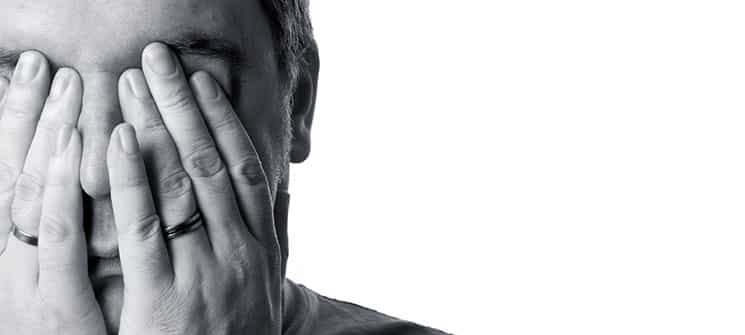More and more people are affected by burnout. The World Health Organisation (WHO) has predicted stress to be the biggest health-hazard in the 21st century. Next to nutrition and exercise, the WHO is counting sleep as the third most important pillar for prevention of stress-caused illness. The sleep psychologist Dr. med. h.c. Guenther W. Amann-Jennson explains, why healthy sleep is helping to find a way out of the vicious circle “burnout”.
Again and again he is checking the watch, time pressure is breathing down his neck. The list of pending tasks seems to be getting longer constantly even the romantic dinner with his wife is becoming a stress-factor. Finally he is falling into bed dead tired -– but, he is not able to even think about sleep, he is tossing and turning. His thoughts are circling around: “What is due tomorrow? I have to get enough sleep, or I am not able to deliver a good performance tomorrow.” After sleeping fitfully he is waking up way to early, completely soaked. The next pointless day is starting.
When the fuel is empty
Such scenes are happening in the lives of many people. Until the day, where the body and the psych of person affected is burnt out in a way, that he has to withdraw from everyday life. Diagnosis: Burnout. The psycho-analytics have taken over this term from engineers and have taken them as a metaphor for a state of exhaustion. Originally, the term described the state of capability depleted fuel rods or rockets without fuel.
Restful breaks are also necessary during the daytime
“Burnout is the result of a vicious circle”, explains sleep psychologist Dr. med. h.c. Guenther W. Amann-Jennson. Under stress, a high amount of corticotropin-releasing hormones (CRH) are released in the brain. This prolongs the REM-phases and the sleeping quality worsens. Unlike the deeply relaxing deep sleep phases with frequent breathing rhythm and heartbeat, the REM-phases are more restless. This leads to a disturbed balance of activation- and deactivation-phases during day time. The recreational effect constantly diminishes, the organism is reaching his limit of performance and regeneration of body, mind and soul – step by step. *1
Actual cause: disturbed sleep!
A more previous study of the Karolinska-Institutet, Sweden, supports this finding. In this study, the sleeping pattern of 35 patients got studied. For at least three months, these persons have not been able to work, due to the burnout-syndrome. As comparison, people with a low risk of burnout were called in. The result showed, that the influence of stress still is existent, but the real cause of burnout is due to disturbed, no more recreational sleep. Besides a cognitive behavioral therapy, the people affected got treated with strict sleeping hygiene. After six to twelve months, significant improvements of the sleeping duration were made and 60 percent of the patients were able to be integrated into the working process again.
Hints for prevention
Mostly, stress is leading to sleep disturbances. As a consequence, body and mind no longer are able to recreate and you are reaching your performance- and regeneration-limit. Optimization of sleeping quality and sleeping duration has proven to be very positive, for prevention as well as in therapy. But, to let healthy sleep happen, it needs a basis that only a holistic, nature-oriented sleeping system is able to fulfil.
Following some hints of the sleeping expert Dr. med. h.c. Amann-Jennson:
• A rhythmic balance between activity and relaxation during daytime prophylactically is very important and is supporting healthy sleep. Ideal is a change of about 70 to 90 minutes lasting activity followed by a deactivation of about 20 minutes. This improves performance- and recreation-ability. *²
• Avoid rhythm-predators*³. These include persistent activation without relaxation like too long meetings, longtime working on computers, exhausting car rides, overstimulation due to nonstop watching TV, irregular working-, sleeping- and eating-times, winter-/summertime changeover, jet lag or technically initiated disturbance zone (TV-set, mobile phones, radio alarm clock) close to the bed.
• Promote rhythm-enhancer on the other hand. The organism is not differing between positive or negative stress but only, are we activated, are we balanced, are we regenerating. Out of this reason, we should emphasize short recreational breaks by letting go, relaxing, contemplation, day dreaming; breath-awareness and –exercises; regular, sufficient sleep.
• Only the combination of “hardware” (sleeping place, bedding system) and “software” (stress-factors, breaks, sunlight/artificial light, habits) meaning a holistically oriented sleep-healthy-concept leads to a biologically high-quality sleep. Thereby, the sleeping underlay is having the biggest “leverage effect” in optimizing sleeping quality and sleep efficiency.
*1: Out of: Max-Planck-Institut für Psychiatrie, Munich (2009). M. Kimura, P. Müller-Preuss, A. Lu, E. Wiesner, C. Flachskamm, W. Wurst: Conditional corticotropin-releasing hormone overexpression in the mouse forebrain enhances rapid eye movement sleep. Molecular Psychiatry, 1–11, Online-prepublication May 20th, 2009.
*2: Out of: Ornstein Robert, The Right Mind, Publ. Harcourt-Brace & Co (1997) / Springer Sally P., Deutsch Georg: Left Brain, Right Brain. Publ. W. H.
*3: Out of: Hecht Karl: Das geomagnetische Feld als biologischer Regulator und dessen Sensibilität gegenüber elektromagnetischen Frequenzen. Journal of preventive medicine, Themenheft „Schlaf und Schlafstörungen“, Issue July 2011.


This post is also available in / Diesen Beitrag gibt es auch in:


Leave a Reply